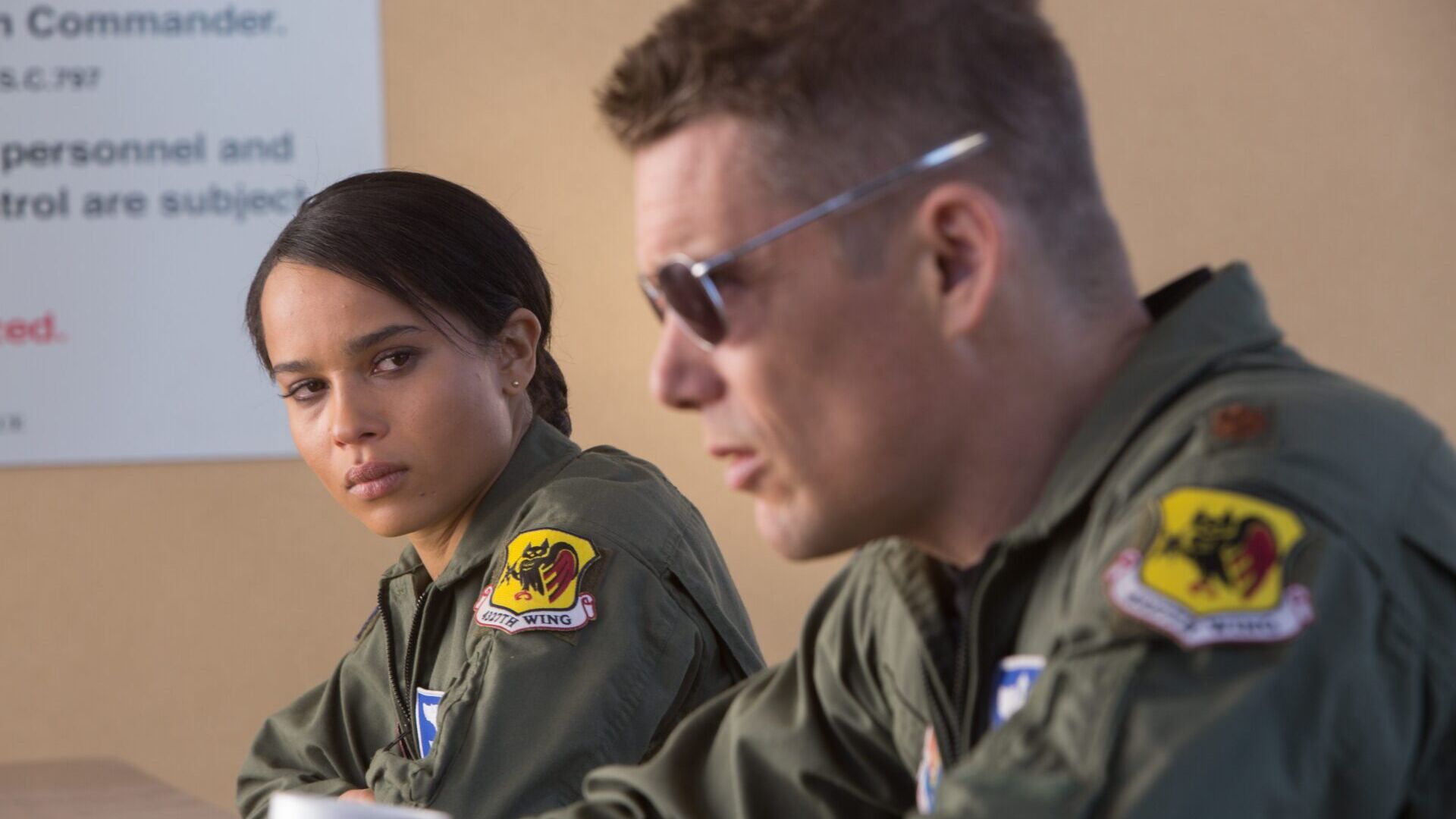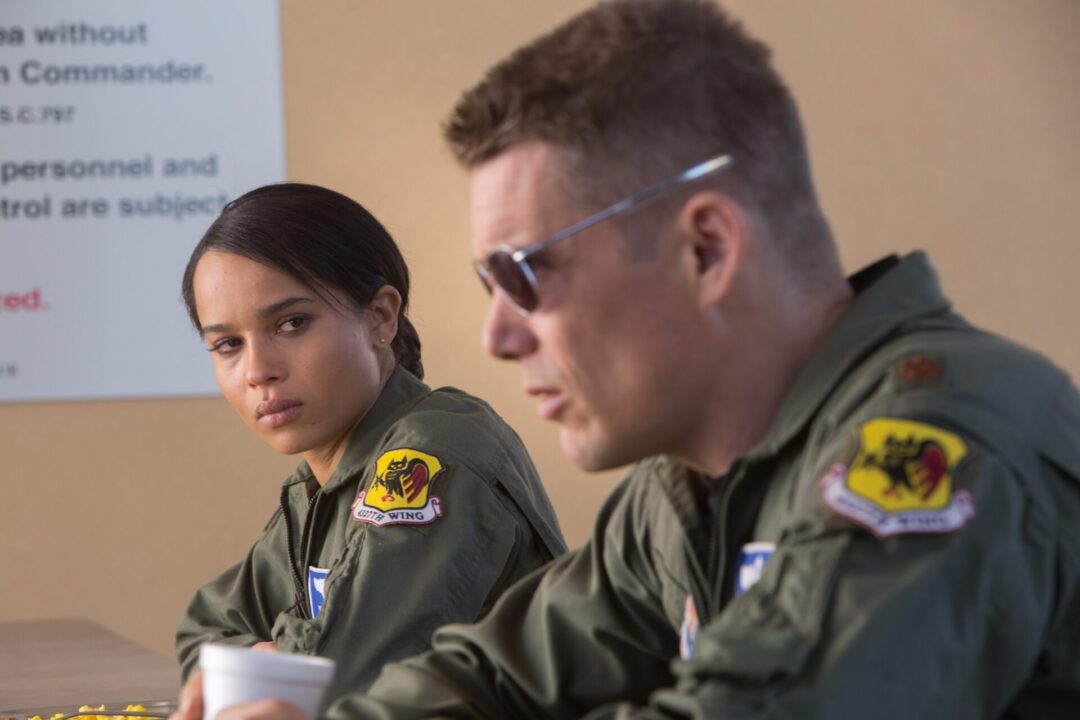In Andrew Niccol’s Good Kill, audiences watch as military drone pilot, Major Thomas Egan (Ethan Hawke) struggles with the morality of being separated from the danger below as well as the ethical absence of his superior’s orders. He is tortured by his thoughts and guilt for his military obligation, and so he turns to alcohol and isolates himself from his wife (January Jones), family and friends. Probably the most interesting aspect of the film is the correlation of his self-destruction over being separate from the violence and his slow drift away from the world around him. However, it is a trait that seems to be a starting point for any contemporary war script.
The war film has been an exciting and popular genre for many years, and is one that grows and develops exponentially as the art of war changes. Following the Vietnam War, films began to steer away from the theme of battlefield glory seen in films such as Kelly’s Heroes or The Longest Day and towards a more analytical standpoint on the psyche of the individual soldier, such as in Apocalypse Now.
Recently, there has been a new shift that seemed to coincide with the United States involvement in Iraq and the Middle East. This shift in perspective is a combination of both of these war film philosophies. While focusing on the mind of the soldier being trapped in a war mentality, it seemingly glorifies the male protagonist for sacrificing his “American Dream Life” for this war machine. However in the case of Good Kill, as with many contemporary war films today, it seems to abandon any sense of responsibility or moral repercussions for Major Egan’s choice of war over family. In the end, he has driven his family away due to his damaged psyche and personal flaws leaving him completely alone, with the exception of an out-of-leftfield romantic interest, Airman Vera Suarez (Zoë Kravitz). However after all of this, his cinematic redemption is killing a rapist thousands of miles away, not dealing with any of these terrible developments on the home front. It is a similar type of perspective to Clint Eastwood’s American Sniper in that Chris Kyle (Bradley Cooper) is celebrated and then empathized with for leaving his family for the greater good. However this type of movie has a polarizing effect on American audiences, which makes sense in the huge variance in socio-political perspective of American society.
There are moments of great suspense, varying depths of depression and a brief sparkle of redemption.
But before this review turns into a discussion of the relationship between a nation’s philosophies and the war films it produces, let’s circle back to the film at hand. Good qualities of Good Kill: as to be expected, Ethan Hawke gives an excellent performance while breaking from his usual, like-able with an edge, type of character we tend to expect. His quiet and distant portrayal of Major Egan seems to be on point with the torn and damaged military archetype. Keeping up with Hawke, is the lovely January Jones. She, however, sticks to the acting chops that garnered her such well-deserved attention as the disgruntled and mistreated housewife in Mad Men, and portrays an excellent disgruntled and mistreated military house wife driving audiences to both despise her condescending tone and spoiled sensibility while still understanding her role in her despairing relationship.
Another point in the plus column, the film was nicely shot and had some very pleasing touches to its aesthetic. The visual similarity between the square, tan buildings that the drone crews are bombing and the square, tan containers that the drone crews work within, creates a visual representation of the connection that the drone operators feel with the bystanders that appear on their screens. This type of symbolism could overpower a scene and draw away from its suspense, however it is done with such subtlety that it sneaks its way in without audiences fully realizing its existence.
On the other side of the coin, there are parts that seemed to draw away from the storyline. Unfortunately, the biggest detractor from the film’s effect lies within the screenplay, and that is the repetition, the repetition, and the repetition. The film seemed to become a bit of a loop revolving from Egan going to work which he doesn’t want to do, killing something he didn’t want to, being told he can’t get back into a jet again which he wants to do, and then going home to be nagged… which he doesn’t want to do. Admittedly, one could argue that this is not redundancy but a very accurate representation of what life is like for a military drone pilot; the annoyance that audiences begin to feel is meant to be a way of connecting the viewer to Egan. However, it seems that Egan was gone before the film even began and so the connection becomes less of a possibility and the repetition becomes a less effective technique.
Good Kill may not be your most intrinsic of war films and because of its polarizing themes that come with a contemporary war plot, audiences will either love it or hate it with little possibility of finding one’s self in the middle. There are moments of great suspense, varying depths of depression and a brief sparkle of redemption. Sometimes that is all a person wants from a movie, and so this film will find its audience.
Good Kill opens in Los Angeles at the Arclight Hollywood this Friday.
Ryan Denman
Ryan is a contributing writer for CINEMACY.


